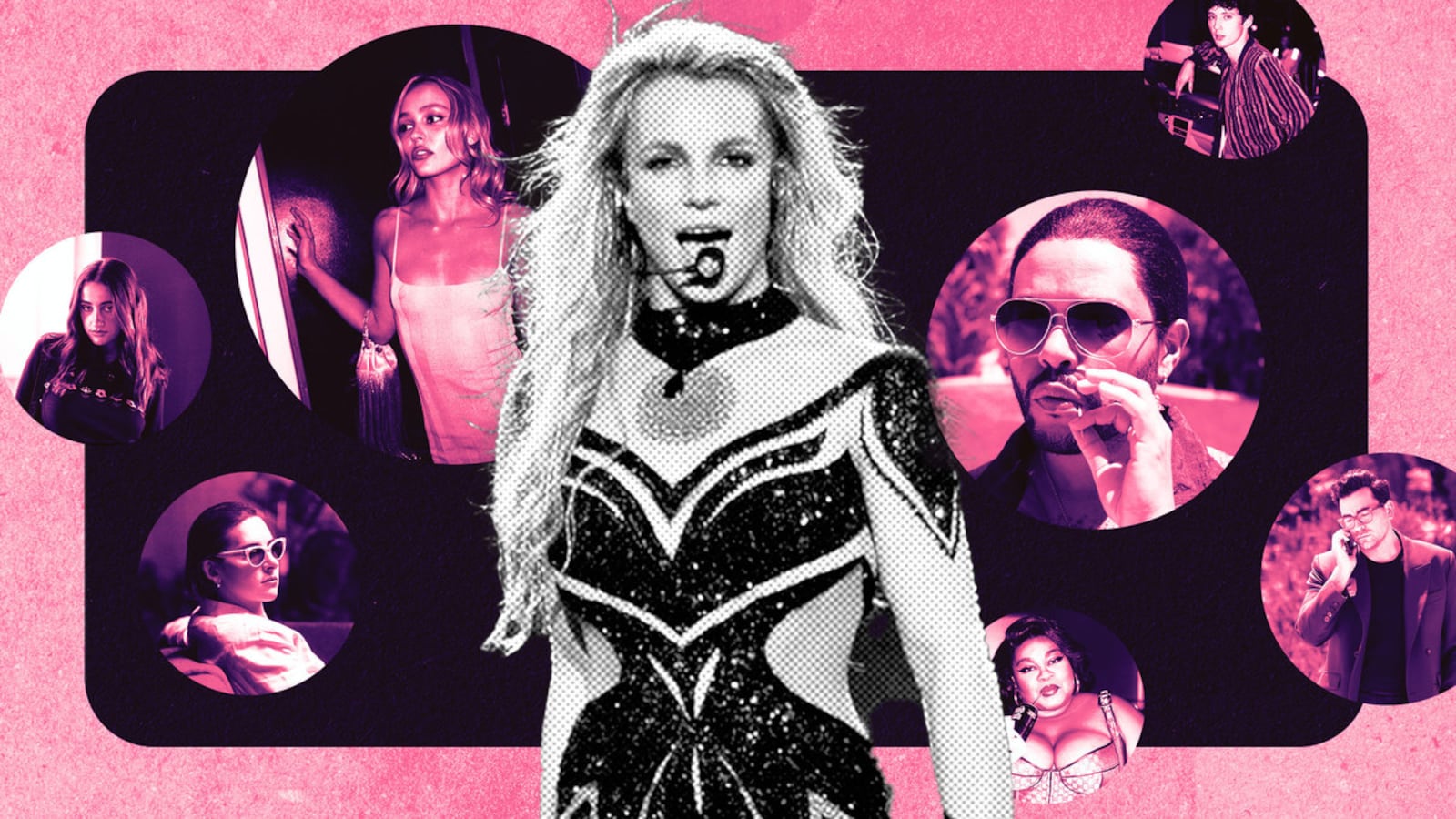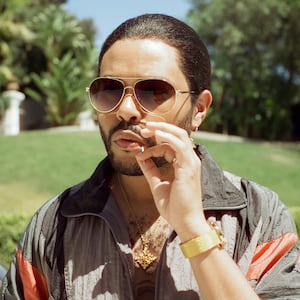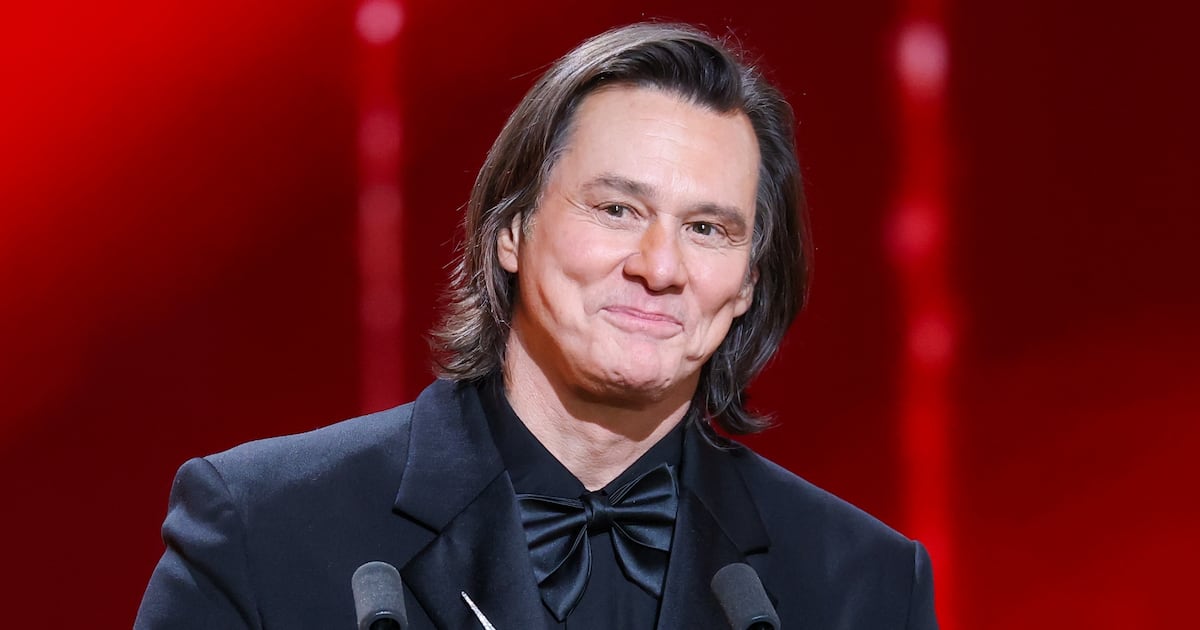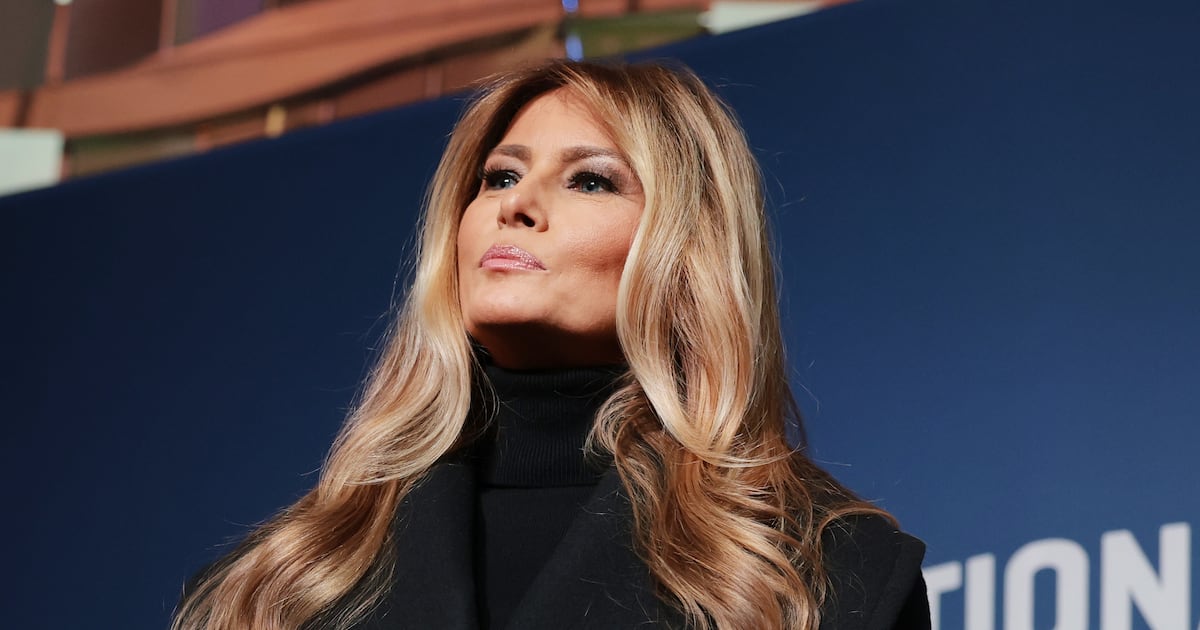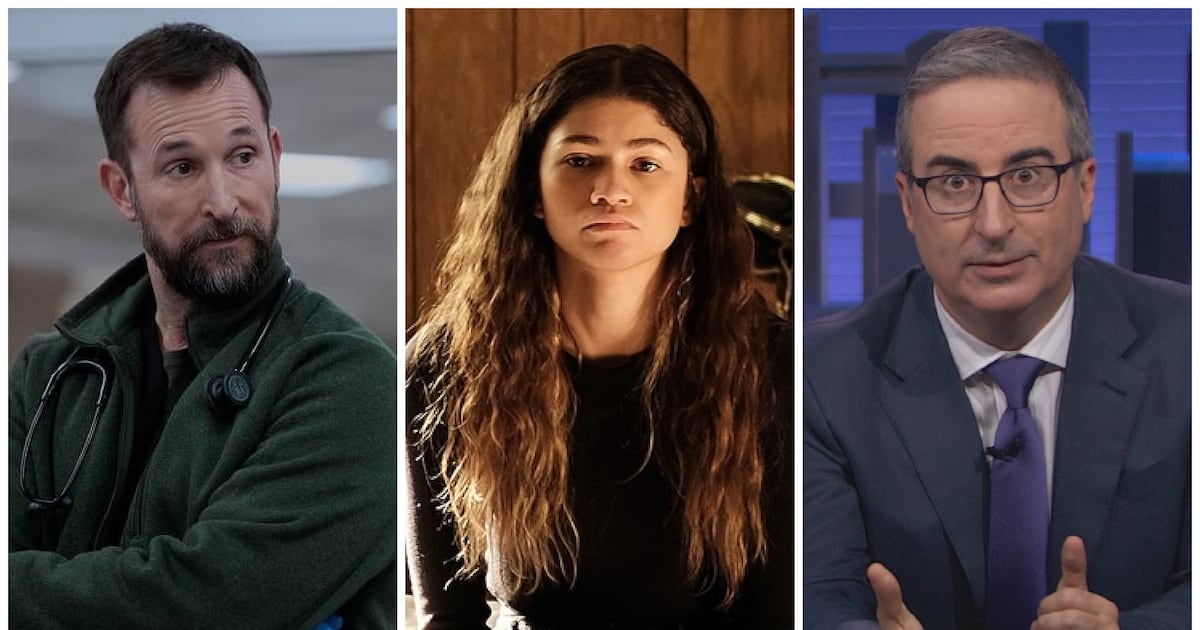Love it or hate it, everyone’s going to be talking about The Idol for the next six weeks. I, personally, adore everything I’ve seen so far. Serve me a piping hot dose of drivel any day! But then again, I’m a sucker for a raunchy dissection of fame’s dark underbelly. As a voracious pop culture connoisseur, there’s nothing more fascinating to me than a piece of entertainment that’s brave enough to tackle the wicked ramifications of glitz and glamour. We see these things play out every day in the headlines of gossip rag websites and Twitter threads, but to actually, acutely study the art of stardom is no simple feat.
To satirize something successfully, one must be a disciple of what they’re sending up. If you half-ass something, chances are that someone in your audience will catch on. Surely The Idol creator and writer Sam Levinson—a nepo baby himself—and its star and co-writer The Weeknd know a thing or two about how Hollywood chews up and spits out its players. However, firsthand experience isn’t enough to rest on when creating something this sprawling and contentious. With a show so controversial, audiences will be clamoring for proof that Levinson and The Weeknd truly know of which they speak.
While, at this point, the jury remains out about whether The Idol’s analysis of pop stardom will become a commentary as blistering as something like Vox Lux, the show is off to a solid start, thanks to a keen eye for pop culture references that are both overt and a bit more understated. (Yes, even on The Idol, things can be understated.) Over the next six weeks, I’ll be chronicling the show’s allusions to entertainment, celebrity, film, television, and music, and breaking down how they enhance, or hinder, the show’s story and themes. Any big spoilers will be marked as such. And if you have a question about my credentials, take it up with the homemade Lady Gaga disco stick I cobbled together at age 14.
Episode 1, “Pop Tarts and Rat Tales”
It’s Britney, bitch!: It would be impossible to make a good show about a harangued pop star without mentioning the great Britney Spears. The series’ third trailer gleefully (and expertly) used Spears’ “Gimme More,” notable for being Spears’ comeback single after the buzzcut heard round the world. Lily-Rose Depp’s character Jocelyn is similarly troubled, fresh from a mental breakdown that landed her in the hospital. Jocelyn and Britney’s journeys are meant to be parallel, with Vanity Fair reporter Talia (Hari Nef) commenting on the “referential” choreography for Jocelyn’s next single.
“It’s an homage,” responds one of Jocelyn’s many team members, Nikki (Jane Adams). “I think what Britney and Jocelyn have gone through is really unique…look at what she’s overcome, with Britney as well. People count them out. This is Jocelyn saying, ‘I will not be written off.’” Talia also mentions that she “grew up watching Jocelyn on Rock House,” a fictional kids’ television show that Jocelyn was cast in, like how Spears was in The Mickey Mouse Club.
Levinson has denied that Jocelyn is based on any one particular starlet, but the show certainly owns up to its Britney references, and could even potentially involve Spears in some way. In 2021, Spears posted a photo shortly after her conservatorship was terminated, saying she “just shot a movie titled ‘THE IDOL.’” It’s unclear if whatever that project was is the same as this one, but Levinson and The Weeknd were pictured with Spears last summer. Perhaps we’re building up to a cameo.
Pop Star Reference Clocker: During a photo shoot for her album cover, Jocelyn sports a hospital bracelet to allude to her recent stint in a medical center. The bracelet immediately conjures memories of the one Selena Gomez wore in the artwork for her “Bad Liar” single cover, referencing her own hospitalization for Lupus treatment.
Later, when Jocelyn and her crew go out to a club, they all dance to Madonna’s “Like a Prayer.” Naturally, Madonna has contributed to the show’s official soundtrack.
At the club, Jocelyn meets Tedros, the enigmatic guru who is about to turn her life and career upside down. When she invites him over to her house, the two of them cozy up, and she mentions that she thinks pop music is superficial. Tedros and her both agree that Prince’s “When Doves Cry” is the antithesis of pop’s superficiality.
When Jocelyn plays Tedros a demo of her new song “World Class Sinner,” Tedros says that it’s bad because he doesn’t believe her. He cites Donna Summer’s “Love to Love You Baby” as an example of what Jocelyn should be doing in the vocal booth. “When she sings, there’s no doubt that she knows how to fuck,” Tedros says.
Read me my rights and arrest me: Jocelyn and her best friend/assistant, Leia, have a quiet evening at home, watching Basic Instinct. This one’s easy to break down. At its core, The Idol is a modern spin on the erotic thriller genre. Levinson’s direction shares a lot of the same trademarks as Basic Instinct’s director, Paul Verhoeven. Verhoeven’s films blend sex and violence, sometimes to the point where their differences are indistinguishable, in order to commentate on social mores. Levinson’s works have all done this as well and have been equally as controversial as Verhoeven’s best-known films; no doubt Levinson is likening himself to Verhoeven with this inclusion.
If you haven’t seen it (get on it), Basic Instinct follows a writer of crime fiction who murders her boyfriends, and lures the cop investigating her into her trap. In the scene that Jocelyn and Leia are watching, Sharon Stone tells Michael Douglas that, in her next novel, a detective falls for the wrong woman, and she kills him. That line of dialogue punctuates the scene, and it could be some foreshadowing as to what ultimately happens with Jocelyn and Tedros.
Hollywood bloodsuckers: The Weeknd has compared Tedros to Dracula, and it seems like that’s not too far from the truth, judging by how the camera frames his character. When Tedros arrives at Jocelyn's mansion, her palatial gates slowly open to his silhouette, shrouded in darkness, his long, black coat looking more like a cape. He’s dressed almost exactly like Wesley Snipes in Blade. While this does give him an air of menace, it also shows us that Tedros is trying to look the part. He desperately wants to be sexy, mysterious, and irresistible to get control over Jocelyn. Like a vampire, once he’s invited inside, there’s no turning back.
My Dear Narcissism: No surprise that a show starring and co-written by The Weeknd is going to get a little self-referential. When Jocelyn and Tedros are making out in the depths of his club, his face is often half-covered, while the other half is bathed in red light. These shots look almost exactly like the cover of his My Dear Melancholy EP.
Jocelyn also loves erotic asphyxiation, and she later allows Tedros to choke her, resulting in him covering her face with a robe, and tying its velvet drawstring around her neck. The Weeknd is no stranger to kink play. In fact, he’s got a whole song and music video about a woman asking him to choke her.
Pop Star Reference Clocker: When Jocelyn plays the remixed version of “World Class Sinner” for her team, it begins with a section of heavy moaning and breathy gasping. Later, Donna Summer’s “Love to Love You Baby” plays over the end credits, pleasantly closing the loop between the first and last scenes. It’s also an obvious callback to last week’s episode, where Tedros references this particular song to Jocelyn, when he’s telling her how to make music that sounds like she knows how to fuck. Our poor pop protagonist is easily influenced.
My Dear Narcissism: The “World Class Sinner” remix also sounds almost exactly like a Beauty Behind the Madness-era The Weeknd song. To be fair, that record did have some massive hits (in 2014!).
Blister Babe: At Jocelyn’s music video shoot from hell—where a flustered director watches her vision crumble—the neon-lit signs, massive team of dancers, and lush colors are all reminiscent of director Hannah Lux Davis’ trademarks. Davis has worked with Ariana Grande, Charli XCX, Demi Lovato, and many more uber-famous pop stars. Jocelyn’s set looks like something right out of the “Side to Side,” “7 Rings,” or “Sorry Not Sorry” videos.
Dyanne in Your Area: Jocelyn’s friend, the dancer Dyanne, is played by K-Pop group BLACKPINK’s Jennie Kim. When Jocelyn’s label manager Nikki finds out that Dyanne—who has been nailing the video choreography at the shoot—can also sing, Nikki shuffles her off-set to immediately lay down a demo track. We find out in this episode that Dyanne’s intentions with Jocelyn aren’t pure at all, and now she’ll have to compete with a huge international star? Good luck booking that stage, Joss!
Chlorinated Cool-Offs: When Tedros’ friend Chloe (Suzanna Son) arrives at Jocelyn’s mansion, she immediately strips off all of her clothes and jumps into one of Jocelyn’s two pools. Given that Sam Levinson directly referenced Verhoeven’s Basic Instinct last week, seeing a pair of bare breasts splashing around in a pool immediately recalls the infamous pool sex scene in Verhoeven’s Showgirls—another fantastic erotic drama maligned upon release.
My Dear Narcissism: This episode wasn’t as filled to the brim with references, likely because every character spent the majority of the runtime talking about super-producer Mike Dean, who Tedros has tapped to helm Jocelyn’s new EP. This is perhaps The Weeknd’s most meta self-reference so far, as Dean has already been producing songs for The Idol in real life. Dean is a longtime collaborator with The Weeknd, working with the artist on-and-off since 2015. Dean is even due to appear on the show in an upcoming episode; look out for the tatted guy with the bong.
Big mistake, huge!: Jocelyn and Tedros oral-sex-filled shopping trip to Valentino is immediately reminiscent of the iconic Rodeo Drive shopping spree scene in Pretty Woman. Although, it must be said, Julia Roberts is a far more imposing presence than Tedros ever could be, despite his low-level threats to the shop attendants.
Episode 4, “Stars Belong to the World”
A John Lennon Lemon: Episode 4 opens with The Weeknd’s cover of John Lennon’s “Jealous Guy,” a song written from the point of view of a man who hurt his lover in some way. Since Episode 3 ended with Tedros trying to open Jocelyn’s artistic spirit by recreating the abuse she suffered at the prods of her mother’s hairbrush, it’s technically a fitting cover. And, to be fair, The Weeknd’s voice on the song is quite nice. But the whole song (plus the John Lennon-and-Tedros combination of it all) brings a huge ick factor—not to mention a choice that again pulls us from the show’s narrative, with the inclusion of a Weeknd.
My Dear Narcissism: As promised through the constant repetition of his name in Episode 3, this week we were treated(?) to an appearance by producer Mike Dean, playing himself. That also meant that Dean got to bring his bong, as he’s a big weed guy, judging by his Instagram account. Dean comes along to recreate the synth basslines of The Weeknd’s songs for Jocelyn, in a song for her new EP called “Fill The Void.” Everyone says it’s a hit, but it’s pretty tame. I guess since The Weeknd doesn’t exist in the Idol universe, maybe Joss is the first to have this sound, and everyone is going to lose their minds over some gothic synths.
TikTok on the Clock: Tedros’ enclave of artistic interlopers taking over Jocelyn’s house is reminiscent of both ’70s-era Fleetwood Mac intra-band dalliances and modern TikTok hype houses. Groups of artists living, working, and creating together isn’t a new phenomenon; the musician Chan Marshall, aka Cat Power, took a somewhat similar path to Jocelyn. There’s a solid biography of Cat Power that dives further into the subject of her life story. In fact, a large part of Jocelyn’s backstory feels inspired by the story of Cat Power’s rise to fame and resilience.
Song to Song: What was originally supposed to be Jocelyn’s new single, “World Class Sinner,” now belongs to Dyanne, who was just signed to Joss’ label. Songs traveling from artist to artist is a pretty common occurrence in the industry; T-Pain even made a video a couple of years back detailing how Ariana Grande’s “R.E.M.” first went from him to Beyoncé, then eventually made its way to Grande’s 2018 album Sweetener.
Kids Incorporated: The Idol has been pretty bad about grazing over the genesis of Xander’s and Jocelyn’s relationship, and if you’re even more confused after that shock collar scene in tonight’s episode, I’ve got your answer. Joss and Xander starred together in Rock House, a fictional kids TV show, in the vein of Kids Incorporated, The Mickey Mouse Club, or—perhaps more memorable for Gen Z—Sonny with a Chance. It was there that Joss’ mom outed him and ruined his burgeoning career, giving Xander a taste of the reckless evil that she was doling out to Jocelyn.
Episode 5, “Jocelyn Forever”
Once Upon a Time In Jocelyn’s House: The longest stretch of the season (or, more likely, series) finale took place during a showcase of all of Tedros’ “found family,” performing the little songs that they’d developed under his tutelage. By some stretch of the imagination, all of the execs at Jocelyn’s record company totally buy into it, asserting that this band of misfits would somehow work perfectly as openers of a pop star’s stadium tour? Okay.
During this showcase, Live Nation exec Andrew Finkelstein (Eli Roth) compares Tedros to Charles Manson, who “moved into Dennis Wilson’s house and lived there a year and a half.” Likening Tedros to Manson seems like the entire crux of The Idol, one that the show had so much difficulty ever nailing because of Tedros’ lack of insidiousness. So much for all of that vampiric suaveness that Tedros had five weeks ago in Episode 1. How far the mighty can fall.
A Flash of Flash: Speaking of how far things can fall, Jocelyn’s ex-boyfriend, Rob (Karl Glusman), is accused of rape. This is part of a lame master plan orchestrated by Tedros to get Rob out of the picture, right before Rob’s big, career-altering superhero movie is due to release. This is reminiscent of The Flash’s tortured journey to the big screen, due to star Ezra Miller’s alleged misconduct.
Dole-Not-So-Mighty: After Tedros is kicked out of Jocelyn’s life for good, with Jocelyn’s Vanity Fair profile now turning into a Tedros exposé, Jocelyn welcomes her torrid lover back. On his way to meet up with her at SoFi Stadium for her first tour date, security makes fun of his suit, calling him Dolemite, in reference to the 1975 Blaxploitation film of the same name (and later the 2019 remake).
My Dear Narcissism: One last one for the books! Jocelyn’s first tour date was filmed at a The Weeknd show in SoFi Stadium, during his After Hours til Dawn tour. The big red moon that can be seen when Jocelyn emerges on stage was a fixture set piece during the tour, and a pretty glaring, can’t-miss shot for anyone remotely familiar with The Weeknd’s work.
That’s not necessarily all that surprising; during the production of 2018’s A Star Is Born, concert scenes were filmed at Coachella, during the weeks that Lady Gaga was headlining.
Sometimes, you’ve just got to work with what you have to save a few million dollars. Renting out and filling SoFi Stadium is a pretty lofty task anyway—almost as lofty as creating a decent five-episode dissection of pop stardom, which The Idol ended up failing to do. The series plateaued shortly after the premiere, and perhaps hoped that smoke and mirrors could keep it running on fumes until the end. I don’t think we’ll be back for a second round of Idol pop culture references sometime in the future, but if there’s one thing the show got right, it’s this: The entertainment industry is unpredictable.
Read more of our The Idol coverage HERE.

